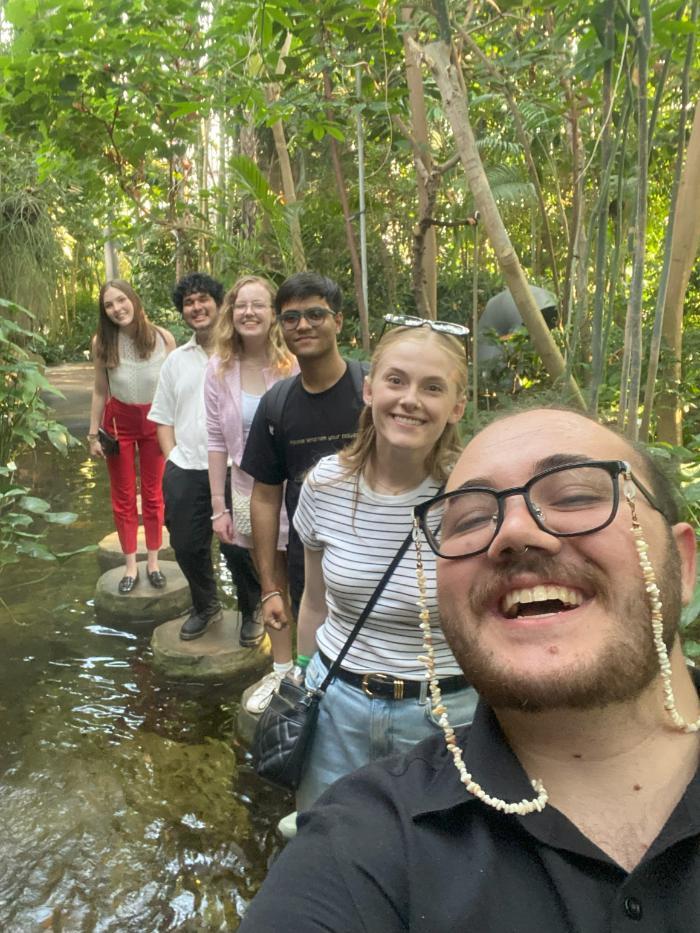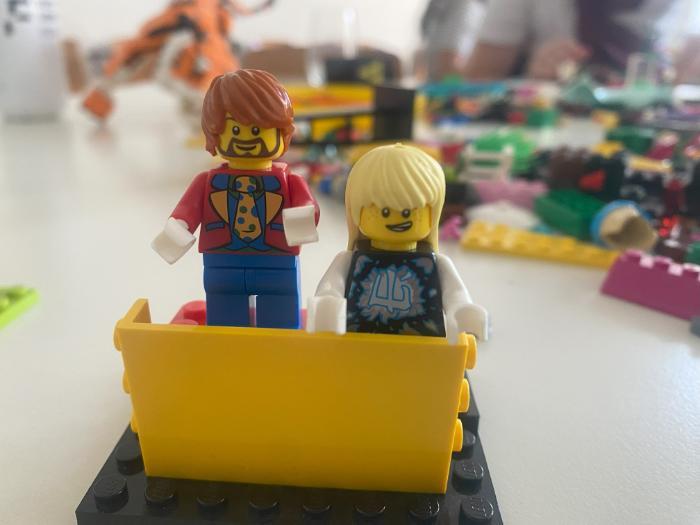The Una Europa Student Congress is an annual gathering of students from the Una Europa partner universities to discuss topics and themes relevant to student communities. This year, the Una Europa Student Congress took place from 17 - 20 September at the Freie Universität Berlin, where students had the opportunity to participate in workshops and micro-challenges addressing central questions about student life at European universities, focusing on topics such as being human in a digital world, the societal impact of universities, and future trends in higher education.
Aoife Joy Keogh (pictured below, second from right), a Third Year PhD candidate at the UCD School of Education, participated in the Una Europa Student Congress alongside five other UCD students. Read more about what Aoife had to say about her experience below.

This September, I had the privilege of travelling with a group of fellow UCD students to attend the Una Europa Student Congress in Freie Universität Berlin. Alongside my fellow students, I represented my university at what was a unique opportunity for dialogue and engagement. While I had a detailed programme in hand, I was still not entirely sure what to expect of this new community that I was immersing myself into. What followed was an action-packed week full of activities and workshops that encouraged students to think critically and engage authentically in discussion with one another about the future of higher education.
I had learned about Una Europa through the UCD College of Social Sciences and Law (CoSSL) Research Impact and Innovation Committee. I serve as the PhD representative on this Committee for the 12 schools of CoSSL. The activities of Una Europa were brought to my attention at a Committee meeting, and I was immediately drawn to the collaborative and innovative nature of Una Europa. For those unfamiliar with Una Europa, it is an alliance of 11 European research-intensive universities that seeks to bring together students and experts from a wide range of fields to collaborate in order to shape the future of higher education in Europe and beyond.
The Una Europa Student Congress takes place annually at one of the 11 partner institutions. The Student Congress spanned four days and entailed a varied programme of panel discussions, workshops, and social gatherings. The theme of this year’s Student Congress was ‘Dis-/Assemble: Reinventing the University’, which comprised three areas of focus: (i) being human in a digital world, (ii) the relevance of universities to society, (iii) shaping future trends in higher education. I was particularly drawn to the third focus area, given that my PhD research focuses on education and lifelong learning.

Two particular activities of the Student Congress really allowed myself and other students in attendance to dis-/assemble what we wanted higher education to look like in the future. The first was a brilliant LEGO® Serious Play® Workshop facilitated by Dr. Cynthia Heiner, a physicist and educator at Freie Universität Berlin. The workshop involved engaging in participatory methods such as journey mapping, where we considered our own journeys within the university setting with regards to teaching and learning, and involvement in the university community. We then engaged in a series of mini challenges that required us to use LEGO® to visualise the future of higher education. We were encouraged to “listen with our eyes” (observe the LEGO® structures built by people as they were speaking) and engage in inquiry-based learning to explore ideas through play. This was definitely a highlight of the Student Congress for me and many other students!
We also had a panel discussion on the topic of “Re-Inventing the University of the Future: Una Europa as an Institution and an Expectation”. This was a very future-oriented discussion, and the perspectives of the panellists offered many varied insights into the topic. The panel discussion was then opened to the wider room, allowing students to contribute to the discussion and pose questions regarding this topic. This was perhaps the most insightful part of the panel, providing a platform to hear the student voice. Students gave a call for action in relation to shaping the future of higher education, and their passion and drive were evident within their contributions. I felt truly empowered within the discussion; the agency, courage, and self-efficacy displayed by those contributing to the discussion provided me with a great sense of hope for the future.
Among other highlights for me were the micro-challenges and social activities organised by the team at Freie Universität Berlin. My micro-challenge involved a visit to K.I.E.Z., the Artificial Intelligence Entrepreneurship Centre in Berlin. Here, I worked with other students under the guidance of theatre-maker Aldo Spahiu to explore the focus area of ‘Being Human in a Digital World’ through improvisational theatre. The micro-challenge was incredibly engaging and created a sense of openness within the group to explore the topic in an accessible way, regardless of individuals’ background knowledge or experience of digital technology and/or theatre.
Social activities such as the Opening Get-Together and Student Award Showcase, which opened and closed the week, were also wonderful opportunities for students to get to know one another. Through both the workshops and social activities, students were enabled to gain an insight into not only their diverse experiences as students, but also their aspirations for the future of higher education. I feel that the Student Congress enabled me and my fellow students to not only engage in dialogue, but also both self and communal reflection of the theme of the Congress.
For those considering applying to attend the Una Europa Student Congress or getting involved in Una Europa activities, I would encourage you to fully embrace the opportunity and open yourself to the new experiences that are in store for you! If you are hesitant to apply due to your field of study, please remember that Una Europa needs diverse voices that speak to different issues. Through this experience I have learned that Una Europa is a community of practice which empowers the collective, rather than the individual. Regardless of your field of study, you have something to offer this community!
I would highly recommend any student who is interested in getting involved in Una Europa to take the plunge. I am so glad to have begun my own journey with Una Europa, where the friendships I have made with the students and colleagues I have met will hopefully pave the way for long-lasting relationships that can evolve into future research collaborations, professional relationships and friendships across Europe.